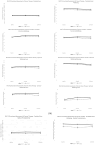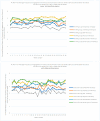Assessing the Impact of the Prostate Cancer Patient Empowerment Program (PC-PEP) on Relationship Satisfaction, Quality of Life, and Support Group Participation: A Randomized Clinical Trial
- PMID: 39451783
- PMCID: PMC11506086
- DOI: 10.3390/curroncol31100479
Assessing the Impact of the Prostate Cancer Patient Empowerment Program (PC-PEP) on Relationship Satisfaction, Quality of Life, and Support Group Participation: A Randomized Clinical Trial
Abstract
Background/Objectives: The Prostate Cancer Patient Empowerment Program (PC-PEP) is a 6-month, home-based intervention aimed at enhancing mental health in men undergoing curative prostate cancer treatment. This exploratory secondary analysis evaluates PC-PEP's impact on relationship satisfaction, quality of life, and support group attendance among partnered participants. Methods: In a crossover randomized clinical trial ClinicalTrials.gov identifier: NCT03660085) of 128 men aged 50-82 scheduled for curative prostate cancer surgery or radiotherapy, 119 participants in relationships were included. Of these, 59 received the 6-month PC-PEP intervention, while 60 were randomized to a waitlist-control arm, receiving standard care for 6 months before starting PC-PEP. The intervention included daily emails with video instructions on mental and physical health, diet, social support, fitness, stress reduction, and intimacy. Outcomes were assessed using the Dyadic Adjustment Scale (DAS) and the Functional Assessment of Cancer Therapy-Prostate (FACT-P). Results: While relationship satisfaction remained stable, a significant improvement in emotional well-being was observed at 12 months in participants undergoing radiation therapy (p = 0.045). The PC-PEP intervention also led to significantly higher support group attendance at both 6 months (p = 0.001) and 12 months (p = 0.003), emphasizing its role in fostering social support and community engagement. Conclusions: The PC-PEP program effectively maintains relationship satisfaction and enhances emotional well-being, particularly in patients with fewer physical side effects. Its design promotes comprehensive care by integrating physical, psychological, and social support, making it a valuable resource for improving the quality of life in prostate cancer patients and potentially applicable to other cancer types.
Keywords: curative treatment; emotional well-being; functional well-being; prostate cancer; radiation therapy; radical prostatectomy; relationship satisfaction; social well-being; spiritual well-being; support group attendance.
Conflict of interest statement
The authors declare no conflicts of interest. The funders had no role in the design of the study; in the collection, analyses, or interpretation of data; in the writing of the manuscript; or in the decision to publish the results.
Figures








References
-
- Canadian Cancer Statistics 2023. [(accessed on 13 August 2024)]. Available online: https://cdn.cancer.ca/-/media/files/research/cancer-statistics/2023-stat....
-
- Sánchez Sánchez E., González Baena A.C., González Cáliz C., Caballero Paredes F., Moyano Calvo J.L., Castiñeiras Fernández J. Prevalence of Anxiety and Depression in Prostate Cancer Patients and Their Spouses: An Unaddressed Reality. Prostate Cancer. 2020;2020:4393175. doi: 10.1155/2020/4393175. - DOI - PMC - PubMed
Publication types
MeSH terms
Associated data
Grants and funding
LinkOut - more resources
Full Text Sources
Medical
Research Materials
Miscellaneous

